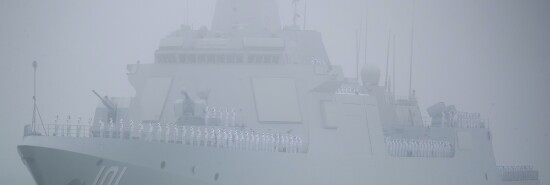
Fortunately for China, Congress remains beholden to the Littoral Combat Ship
Tom Rogan
The House China Select Committee is doing immensely important work.
Communist China poses a preeminent threat to United States national security, prosperity, and values. Xi Jinping, having ordered his People’s Liberation Army military to be ready to seize Taiwan by 2027, the Committee’s efforts can tolerate no delay. China must be the unquestioned priority for U.S. military readiness. Rep. Mike Gallagher (R-WI) deserves credit for the positive steps taken thus far.
UK FOREIGN SECRETARY BREAKS WITH US IN KEYNOTE CHINA SPEECH
Still, the Committee suffers from one glaring failure: it remains beholden to the Navy’s Littoral Combat Ship.
The Littoral Combat Ship is a disaster. It is under-armed, beset by malfunctions, and useless for air defense, a very big problem against the PLA. It costs a huge amount of money to maintain, and it cannot operate close to Chinese or Russian naval strongholds.
If the Navy ever puts an LCS into the northern South China Sea or the approaches to Taiwan, it will almost certainly sink. Its sailors and embarked Marines are going to suffer mortal concussive injuries, burn to death, or drown. The Navy knows this.
It should be a presumption of fact, then, that the China Select Committee supports the Navy’s request to get rid of the LCS. Recognizing Congressional support for the ships, the Navy’s 2023-2024 budget request asks that just two of the ships be stricken from the fleet. Accepting that request should be a no-brainer for Congress.
After all, by ridding themselves of these coral reefs-in-waiting, the Navy can redeploy personnel, funding, construction and maintenance yards, and other capabilities to priorities that might actually make a difference in any war with China.
That means things like long-range missiles, more survivable destroyers, and attack submarines.
Head of Indo-Pacific Command Adm. John Aquilino has made clear that he needs warships with “the critical capabilities of being able to operate in contested space.” The LCS is the antithesis of that. It is certainly true that striking the LCS would reduce the fleet size without near-term replacement options, a result of the broader ship procurement crisis. The point is that the LCS is so prospectively useless against China that having no replacement at all is preferable to having these ships in service.
Unfortunately, top members of the China Select Committee disagree.
Gallagher, whose district includes a major LCS construction facility, told the Cavaships podcast in March 2022 that the ships should be saved, as “we’re just not in the position to turn away hulls that can contribute to the fight.” He suggested they might be used “creatively” as amphibious craft for the Marine Corps, or as floating missile platforms for Marine skirmishing units, as command and control nodes, or as drone platforms.
On paper, these proposals seem sensible, but they are not, in fact, feasible.
The LCS is small and would still need to be crewed by sailors. Space available for embarked Marines would be highly limited even in an ideal scenario. More importantly, the LCS is simply too unreliable and too lightly armed to play any role in the fight. It would be highly vulnerable to PLA saturation missile or naval strikes. Even older classes of PLA warships could sink it.
In turn, the U.S. Navy would have to deploy other, more capable warships to escort each LCS. Those other warships would have to come from an already overstretched fleet needed at the front of the fight near Taiwan.
Sillier still is the commentary of fellow China Committee member, Rep. Rob Wittman (R-VA). He says that the LCS is needed to get the fleet up to size. As Wittman recently put it, “I’m not a mathematician, but I want to know how do we do addition by subtraction? How does this budget create the capacity and capability to close this gap? How does this send a message to the Chinese that this is a deterrent effect for what we know is coming?”
There’s a very simple rebuttal to that argument: not all ships are equal.
If you know war with China is coming, the worst possible message to send Beijing is that Congress cares more about pork and campaign donations than it does about equipping the Navy properly to wage war effectively. It’s unfair to single Gallagher and Wittman out here — others, such as Reps. John Rurtherford and Kay Granger, head of the powerful House Appropriations Committee, also support retaining the LCS.
Why? The answer is as predictable as it is sad.
As the New York Times has reported, campaign donations sit front and center in explaining why these decisions are being made. Those responsible for building these ships or benefiting from the commerce, jobs, and supply chains they sustain have a vested interest in ensuring that the ships survive. They’re willing to throw big bucks at politicians to ensure that this happens.
An exigent problem remains, however.
War with China is very likely coming. The Navy is very likely to be outgunned in that fight. It will need all the war-fighting potential it can get. The LCS drains that potential and, if deployed, would endanger American lives without any justifiable military excuse.
At some point, members of Congress need to remember their responsibility to put the nation before their own districts.
